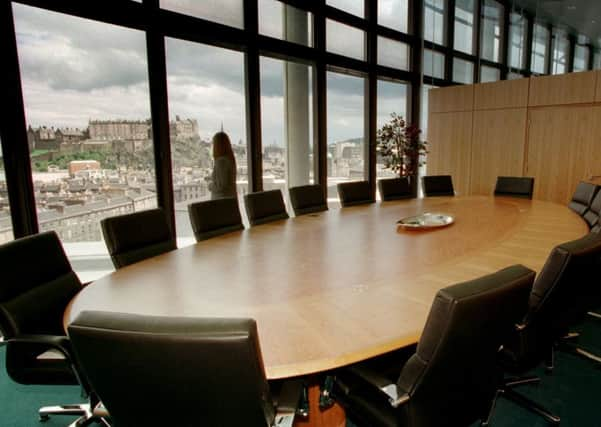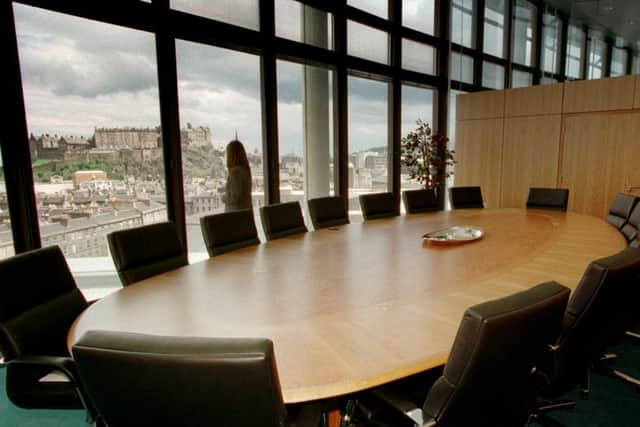Exclusive poll: 1 in 4 Scots experience workplace gender bias


A quarter of people surveyed said they had seen or experienced bias against someone based on their gender in either their current workplace or their last place of work, for those not in employment.
The poll also showed that a political movement to introduce gender quotas in the Scottish Parliament and the public sector does not have the support of the vast majority of Scots –with under a quarter of people saying they would back moves to introduce a mandatory 50:50 split of men and women in senior public sector roles and MSP positions.
Advertisement
Hide AdAdvertisement
Hide AdCampaign groups working to improve gender equality said it was “not surprising” that women continued to face struggles to be perceived as equal at work.


The poll of 1,000 people carried out by ICM found that men and women had equally experienced some kind of gender discrimination in their place of work.
The news comes just days after Scottish Government figures showed that women in Scotland are being paid less than their male colleagues, especially in the older age groups, where it was revealed that females in full-time jobs were paid £1.74 an hour less than men in the same job once they reached the age of 50.
Just over a third of people questioned said they can envisage a time when full gender equality will be reached in Scotland, while more than half said they rated gender equality as important in modern society.


Younger people are more optimistic that gender equality will ultimately be reached, with as many as 58 per cent of 16- to 24-year-olds saying they believe they will experience it in their lifetime. Emma Ritch, executive director of campaign group Engender, said: “As an organisation working towards women’s equality, we’re under no illusions about the scale of the challenge.
“It’s significant that a third of Scots are so daunted by the structural inequalities that remain that they don’t feel they’ll see parity in their lifetimes.
“During the Scottish Parliament elections we will all be talking about the kind of nation we want to be. It’s critical that politicians, media, civil society organisations, and voters include gender equality in those conversations. We want to see firm commitments to make equality happen for Scotland’s women.”
Advertisement
Hide AdAdvertisement
Hide AdWhen asked if they believed the battle for gender had gone too far, 43 per cent of women said it had not gone far enough, with just 13 per cent of females saying they thought campaigners had taken it to extremes. Meanwhile, there was an even split between the 40 per cent of people who believe that International Women’s Day is a “vital” part of the fight for gender equality, while a further 40 per cent said they believed it to be “outdated and unnecessary”.
Talat Yaqoob, co-founder and chair of Women 50:50, which campaigns for an equal number of women as men in political forums and on company boards, said: “It is disappointing but not surprising that one in four people polled have reported that they have experienced gender inequality in the workplace.
“Until we tackle society-wide sexism, we will continue to have workplaces where women are not treated as equals. We must do more to challenge the industry and make our workplaces more progressive. Better recruitment policy, better equality and diversity training, tackling maternity discrimination and challenging casual sexism, all must be taken seriously to instigate any real change.”
Ms Yaqoob, whose group is backed by First Minister Nicola Sturgeon and the Scottish Labour leader, Kezia Dugdale, said the fact that two-thirds of people do not believe that gender equality will be achieved in their lifetime shows that gender discrimination is “deeply institutionalised”.
“This is deeply saddening and it shows how much work we need to do, to create a fairer Scotland for women,” she said.
The poll found that just 23 per cent of people say they would back moves to introduce a mandatory 50:50 split of men and women in senior roles and MSP positions.
More women than men were keen to put in place formal procedures to ensure equal gender representation at Holyrood, but just 27 per cent of females and 19 per cent of males said they would like to do so.
Advertisement
Hide AdAdvertisement
Hide AdIn contrast, three-quarters of men and two-thirds of women said they wanted the best people to be selected to run to be a Member of the Scottish Parliament irrespective of their gender.
The same proportion of people said they believed that senior public sector appointments should be awarded to the best person for the job, whether man or woman.
Despite making up 52 per cent of the population, in Scotland women only account for 36 per cent of public boards, fewer than 35 per cent of MSPs and 24 per cent of local councillors, according to Women 50:50. Ms Yaqoob said: “If the majority of people prioritised gender equality and challenged discrimination, it would cease to be a problem.”
Last year, Creative Scotland became the first public-sector body in Scotland to have a 50:50 gender split.
Four out of five of the party leaders in Scotland have signed up to the campaign, with only the Scottish Conservatives lobbying for the status quo.
Scottish Conservative MSP Liz Smith said: “Forcing a 50:50 ratio would exclude some talented individuals from politics and top jobs purely because of their gender.
“It’s no surprise the public don’t support this – they see it as gerrymandering. I don’t believe my female colleagues want to win a seat or a position on a board thanks to being a woman – they want it on merit.”
Scottish Labour equalities spokeswoman Jenny Marra said: “Labour is committed to building a fairer Scotland, with so much more work to do to shatter the glass ceiling we remain committed to equal representation of candidates going into the Scottish elections. ”
Advertisement
Hide AdAdvertisement
Hide AdResearch for a conference held by Women 50:50 last year showed that more women are likely to make it to Holyrood at this year’s Scottish election as a result of SNP and Labour introducing their own equality initiatives.
Scottish Government spokesperson said that the Partnership for Change 50/50 by 2020 campaign, which invites public bodies, businesses and third sector organisations to sign up to a commitment to work towards 50/50 gender balance on their boards by 2020,currently has 171 signatories including over 90% of eligible public bodies in Scotland.
She said: “We want a fair and equal Scotland more representative of the society we live in with more women at senior levels and in boardrooms across Scotland.
“We are leading by example with a 50:50 gender balance in our Cabinet. And the picture is improving - more women than men were appointed to the boards of regulated public bodies last year for the first time, with 54 per cent of all appointees being female and the percentage of regulated Ministerial public appointments held by women now over 41 per cent.”